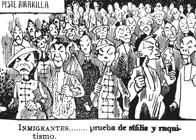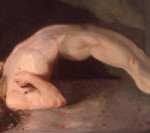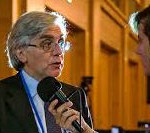April 2016
Arthur Ituassu and Francesc Badia I Dalmases | openDemocracy
This interview is also available in Spanish

Opposition lawmakers celebrate the vote to initiate Dilma Roussef’s impeachment. 11 April 2106. AP Photo/Eraldo Peres. All rights reserved.
Many things can change in ten years or, at least, a lot can happen. There is no doubt that the 10 years from 2005 to 2015 were politically intense in Brazil. Professor Arthur Ituassu has just published “@openDemocracy (2005-15): fragments of Brazil’s recent political history”, an e-book that puts together the series of articles about Brazilian politics written for openDemocracy between the years 2005 and 2015. As the subtitle of this book says, these are fragments of Brazilian recent political history and, more importantly, fragments of Brazil’s restored democratic path, recommenced in the middle of the 1980s after two decades of a military regime.
In this context, Ituassu’s book provides a commentary on the complex dynamics of Brazilian democracy, and strengthens the conviction that, despite some setbacks, democracy is an inevitable prerequisite for Brazilians if they are to deal with their country’s historical injustices. On the eve of Dilma Roussef’s impeachment hearings, Francesc Badia i Dalmases interviews the author.
DemocraciaAbierta (Francesc Badia) – The timing of your e-book coincides with a major crisis in Brazil. Is that crisis a motivation? What can a book like yours bring to the current debate?
Arthur Ituassu – Brazil’s current political crisis is not easily defined. A lot of things can be traced to 2005, when President Lula’s Chief of Staff José Dirceu resigned for corruption allegations concerning the mensalão. This was the first of a series of major corruption scandals within the Workers’ Party (PT) administration, related to a vote-buying scheme that benefitted the government in the Brazilian Congress. José Dirceu, who is still dealing with the Justice, is a historical figure and a PT leader. He fought against the military regime. As a political prisoner, he was among the 15 prisoners exchanged for the American ambassador in Brazil, who had been kidnapped by the resistance in September 1969. Due to his standing, his standing down for corruption allegations, in the first three years of Lula’s first administration, was already a sign of the current political crisis in Brazil. Actually, this is one thing I hope my book contributes to: the understanding that the current crisis is both a political and social process that can be traced back to the first years of the 21st century. Within these processes, a lot of things happened and emerged. We had not only mensalão, petrolão – the corruption scandal involving the Brazilian State oil firm Petrobras –, and lava-jato – Brazil’s Federal Police operation against a money-laundering scheme suspected of moving more than 10 billion reais in bribery, evolving firms, politicians and parties. We also had economic prosperity – Rio’s statue of Christ skyrocketing in The Economist‘s cover –, the large popular protests of 2013 and a FIFA World Cup. Not to mention Lula’s reelection in 2006, Dilma Rousseff’s election in 2010, and her reelection in 2014. We must remember that, after the military regime, Lula and the PT tried three times to reach the Brazilian Presidency unsuccessfully (in 1989, 1994, and 1998). In this sense, it is impossible, at any rate today, to really understand the consequences of all these successive political and social events. However, some new elements seem relative clear.
One of them is a “new right” that has appeared in the Brazilian political spectrum. In March 2010, I wrote for openDemocracy that, after Lula’s two terms, what we had was a “dispute between the left and the left” in that year’s election – that is, between the PT and former President Fernando Henrique Cardoso’s Brazilian Social Democracy Party (PSDB). In fact, the PT and the PSDB have fiercely disputed the last four presidential elections (in 2002, 2006, 2010, and 2014), bringing some checks-and-balances kind of stability to the Brazilian political dynamics. However, I do not think that the “dispute Between the left and the left” would be the case anymore. A new conservative right has emerged and grown in the last decade. Even the PSDB does not seem the old social democratic party anymore, as it is being pressured by its new, young conservative members. Boosted by his performance on Facebook, the ultraconservative Jair Bolsonaro won a seat at the Brazilian Congress in 2014 with 400.000 votes, which made him the most voted representative from Rio de Janeiro, usually a liberal state. As a backdrop, we have the successive and highly mediatized corruption scandals, a growing apolitical sentiment among citizens, and the rise of the Evangelicals as a major conservative political force in the Brazilian politics and culture. The Evangelical Parliamentary Front has today not less than 39 representatives in Congress, who come from all the Brazilian parties. The effects of this conservative mood are already felt in issues concerning abortion, drugs, homosexual rights, and may be felt in the future in economics, with a very technocratic and reductionist interpretation of liberalism.
Another new element of the current political crisis is the “justicialization” of Brazilian politics and society. Not only Sérgio Moro – the judge who is after Lula and the lava-jato case –, but also the Supreme Court and the Federal Court of Accounts have played a major role in the recent political disputes. In addition to this, the imprisonment and prosecution of Petrobras’ directors, CEOs of the powerful Brazilian construction companies, and high-level politicians – such as former President Luís Inácio Lula da Silva -, have caused an earthquake in a country that is used to the impunity of its elites. However, it is very hard to believe that Lula’s PT has invented corruption in Brazilian politics and, because of that, the judicial system must prove that it treats all political parties in the same manner, and that it is not an instrument of the elites to harm only leftists.
DemocraciaAbierta – The last decade, or the last 15 years, have been Brazil’s “Golden years”. Which are the main changes you have observed?
Arthur Ituassu – Brazil has changed a lot in the past 15 years, but these changes are related more to economic benefits than public benefits, more to the social distribution of economic resources and consumption, and less to the social transformation from quality public services for all. Besides the corruption scandals, this is the greatest disappointment Brazilian citizens have experienced regarding a leftist federal administration for more than a decade. The combination of monetary stability, Chinese growth and its demand for commodities, federal industrial incentives, direct income social policies – as the famous Bolsa Família -, big infrastructure projects, and a very closed and potentially large domestic market drove the economic boom of the last decade, which directly benefited some 40 million poor people in the country and produced a whole new social class of consumers (Class C). However, when this is already part of a recent past, when unemployment and recession rule, what is left is a fiscally broken country without a single public benefit being provided properly. Schools and teachers within the Brazilian educational public system still suffer from terrible conditions and salaries. Public hospitals are, as usual, a real tragedy. Every major Brazilian city – and now also the small ones – suffer from violence, crime and guns. Very low quality public transportation is also common. Besides some advances, justice still works more for the rich people than for the poor. Enchanted by consumerism, we have forgotten to continue the reforms we started in the 1990s within the redemocratization process, such as the political reform, the police reform, and the state-pension system reform. However, not everything is rotten “in the state of Denmark”: millions of Brazilians have felt the benefits of economic inclusion, and they will surely pressure to keep them.
DemocraciaAbierta – Brazil’s leadership in Latin America has been very active over the period covered by your book. Its role as an actor of the Global South, in the BRICS, in the Latin American integration, was characterised by a strong personality at the Presidency: Lula da Silva. Up to which extent is Dilma’s leadership to blame for Brazil’s meltdown?
The meltdown is due less to a difference of personality and more to recent global geopolitical transformations. A more effective action by Brazil concerning South America was promoted even before Lula was elected president. In fact, the global conditions during his administration opened a space for a more assertive and wider diplomacy and strategy, with the ascent of new strategic poles and the South-South commercial and financial context. The IBAS (India, Brazil and South Africa) and the BRICS (Brazil, Russia, India, China and South Africa) have tried to manage this new diplomatic space. Of course, Brazilian foreign policy was influenced by the change in the Presidency. Lula is a global political star who was highly praised by the president of the United States Barack Obama in front of the cameras at a UN meeting in April 2009. President Dilma Rousseff, however, has always seemed very uncomfortable when dealing with foreign issues and officials, even with her own foreign ministry, the Itamaraty. But there is also the fact that the 2008 American crisis has been relatively solved, China is not growing so fast but its economic presence in Latin America has grown exponentially, the leftist regimes in South America – especially in Argentina, Bolivia and Venezuela – have been weakened by domestic crisis, and Mexico and the Pacific Alliance have divided the subcontinent. With all this and a serious domestic political and economic crisis, Brazil’s meltdown was inevitable.
DemocraciaAbierta – The publication of your collected openDemocracy essays comes at a time when the overwhelming hegemony of the corporate media and Globo’s network is playing a key role in the current crisis. What about the independent media? How big is the niche for initiatives like DemocraciaAbierta?
The debates concerning the role of the media in Brazilian politics are at the core of the current political crisis in the country. This can be seen as another new element: the legitimacy of the very concentrated Brazilian media establishment. A recent poll (Endelman, 2016) has shown that while 76% of the rich say they trust the media in Brazil, only 52% of the poor say they do. At this very moment, the idea that large media conglomerates always work for the elites against leftist politicians and parties – the impeachment of President Dilma Rousseff included – is widely shared in Brazil and puts a huge question mark on the legitimacy of the country’s media system. In this sense, independent and other media outlets, especially Internet-based, are growing fast, creating a context surely favourable to initiatives such as DemocraciaAbierta.
About the authors:
Arthur Ituassu is a leading Brazilian scholar of social and political science. He is professor in the department of social communication at the Rio de Janeiro, and researcher at the Centro de Estudos Avançados em Democracia Digital (Centre for Advanced Studies in Digital Democracy and E-government (CEADD) in Salvador, Bahia. His website is here.
Francesc Badia i Dalmases is Editor of DemocraciaAbierta. An international affairs expert, author and political analyst, he Tweets @fbadiad











